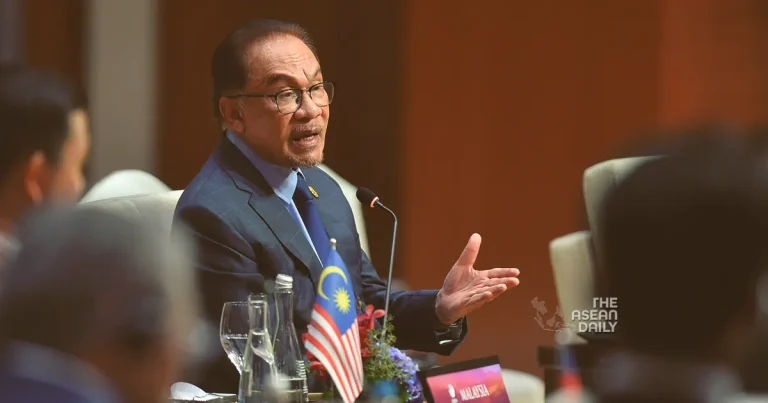7-6-2024 (KUALA LUMPUR) Malaysian Prime Minister Anwar Ibrahim has expressed his commitment to revitalizing several underutilized mechanisms within the Association of Southeast Asian Nations (ASEAN). Speaking at the 37th Asia-Pacific Roundtable in Kuala Lumpur on Thursday, Anwar highlighted the need to breathe new life into platforms such as the ASEAN Regional Forum, the ASEAN Plus meetings, and the East Asia Summit, which have long been celebrated for their convening powers but now appear to “plod along by fact of existence.”
Addressing the gathering, Anwar pledged to tackle this issue as part of a redoubled effort to strengthen the regional grouping. “In these times of great uncertainty, it is imperative to redouble our efforts towards further strengthening ASEAN, to be the key platform in managing regional affairs,” he said. “We need to move from mere rhetoric to concrete action and focus on seeking ways to deliver on its aspirations.”
Anwar’s remarks come as Malaysia prepares to assume the rotating chairmanship of ASEAN in 2025, a pivotal moment that underscores the country’s determination to reinvigorate the bloc’s mechanisms. The Prime Minister has been vocal in recent months about Malaysia’s goals for ASEAN, emphasizing the need for the group to double down on its collective economic strength while tackling pressing issues such as the Myanmar crisis and the territorial disputes in the South China Sea.
Echoing his previous statements, Anwar stressed the importance of a “unified voice” on the situation in Myanmar, given the staggering death toll and the conflict’s far-reaching impact on the region. “A difficult challenge we must contend with is the crisis in Myanmar, given the scale of death, displacement, and fighting,” he said. “Failure to act, when there is ample cause to believe that a member state is violating the spirit of the ASEAN Charter, is a dereliction of our moral duty.”
While acknowledging ASEAN’s limitations in dictating the path forward for the Myanmar people, Anwar emphasized the moral obligation of friends and neighbors to assist where possible. “Of course, ASEAN can only facilitate any efforts when the various parties in Myanmar are ready to do so,” he said. “But this does not mean that we should not try multipronged, more creative tracks. The status quo is not static.”
Anwar pledged that Malaysia would work alongside other ASEAN member states and dialogue partners with influence over Myanmar to push for peace, more effective humanitarian mechanisms, and the eventual political engagement of all relevant stakeholders in the country.
Moving beyond the Myanmar crisis, Anwar also touched on the broader geopolitical tensions that have overshadowed regional mechanisms and multilateral frameworks. “This is a system which was designed in the post-war era to ensure peace and stability, one that held much promise in the rhetoric but proven to be a dismal failure in the delivery,” he said.
In a clear rebuke of suggestions that Malaysia is “tilting to one side” amid the ongoing tensions between the United States and China, Anwar dismissed such claims as “oversimplification” and a “gross misperception” of the country’s national interests and character. “Malaysia is fiercely independent and will continue to strive for its national and strategic interests,” he asserted.
Anwar also reiterated calls for a comprehensive reform and expansion of the United Nations Security Council (UNSC) to ensure equitable regional representation and reflect “current realities.” He emphasized that divergences between the Global North and Global South are no longer solely about development but distinctly ideological, experiential, and perceptual factors. “In the battle for inclusion, it represents the reclaiming of a voice not to be ignored in the international order. We see a reflection of this in the urgent call for restructuring the United Nations,” he said.
As Malaysia prepares to take the helm of ASEAN, experts suggest that Anwar could spend significant political capital to ensure the bloc lives up to its promise under its existing mandate. However, they caution that such an endeavor would require consensus among all ASEAN members and a sustained commitment to reform over an extended period.
On the Myanmar issue, analysts suggest that Malaysia, as ASEAN chair, could engage with various parties in Myanmar as a bloc to push for forward movement in negotiations, potentially putting pressure on recalcitrant actors, including the Myanmar military. Collaboration with other interested actors like Bangladesh, India, China, and the United States could also prove beneficial in facilitating progress on this complex and protracted crisis.




